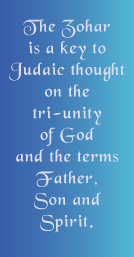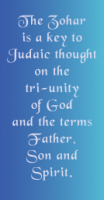I cannot recount for you the many times when discussing the messianic credentials of Jesus with Jewish people that, after layer upon layer of traditional thinking is trimmed away under the laser-like truth of Scripture, we get to the core of their discomfort, which almost always concerns the deity of Messiah not being a Jewish belief. For them, the origin of the deistic concept of Messiah is derived from the trinity of gods found in the pagan culture of those to whom the Apostle Paul ministered. Claim is made that Paul heralded Jesus as fulfilling death and resurrection myths about demigods in order to attract followers to what soon developed into a religion different from that which was first established in Jerusalem.
This viewpoint finds strength in the teaching of (liberal) Christian theologians who expound that it was Paul who founded the Christian religion. Those who adhere to such teachings attempt to separate the ministry of Paul among non-Jews from the Judean Church with its many Jewish members, which they portray as a sect of Judaism, with no firm belief in Messiah as Lord.
Shifting the development of Christianity to Paul and his ministry among the Gentiles strengthens the argument that for a Jewish person to believe in Jesus as Messiah and accept that he is equal with God is contrary to the strict monotheistic teachings of Judaism and the Torah. In promoting this revisionist Church history, they are able to deny the doctrinal solidarity between the diaspora churches established by Paul and the Jerusalem Assembly with its overwhelmingly Jewish congregation that included Priests and Scribes, those who knew the teaching of Judaism yet saw no contradiction in the claim that Jesus was Messiah and Lord.
THE JERUSALEM COUNCIL
Until the First Jewish Revolt against Rome (66-70 CE), the supreme arbiter of the Church was the Jerusalem Council. At first, James the Righteous sat as Prince or Nasi over it. The Council was organized in a traditional Jewish manner modeled after the Sanhedrin. Although disliked by the Jewish religious leadership, James was widely regarded by many as a devout Jew. Paul was subject to the rulings of this council and while equal with the elite among them in the office of Apostle, he submitted himself to its rulings. While there is record of debate and even sharp difference of opinion within the council concerning the addition of non-Jewish believers to the Church and the relationship of the Mosaic Covenant to the New Covenant, there is no record of any dispute concerning the deity of Messiah. The silence on this issue should be deafening! Especially if this was to have been, as is alleged by some scholars, the main difference between the ministry of Paul and that of the Apostles in Jerusalem.
While portions of the Epistles are devoted to explaining the decision of the council in these areas, there is no defense or explanation for the triune nature of God. There is no evidence of division within the Council, or between Paul and the other Apostles in this matter. Rather, there are matter-of-fact statements concerning the tri-unity that leave no room for doubt that both Jewish and non-Jewish Christians understood and accepted this as fact.
JEWISH TEACHING AND THE PLURALITY OF GOD
The origin of Christian doctrine concerning the plurality of majesty within the Godhead was not the result of Paul’s teachings among the Gentiles, nor was it founded in non-Jewish centers of Christian thought that came later such as Alexandria, Egypt, Constantinople (Istanbul), Turkey, or Rome, Italy. The foundation of the Christian doctrine of the tri-unity of God was proposed in the land of Israel through Jewish inquiry concerning the mystery of GOD as revealed in the Hebrew Bible. To understand the true meaning of the title “Son of God” in relation to the Messiah of Israel, it helps to look to Jewish thought during the time of the Second Temple, and not at European mythology, Alexandrian philosophy, or Constantinian orthodoxy for the answer.
In the same way that a study of traditional Jewish life under the Mosaic Law during the Second Temple times cannot ignore the oldest portions of the Talmud and Jewish writings of the period, a study of the nature of God from that time should not ignore the Zohar. The meaning of this word is splendor and refers to the radiance of God. The Zohar is a small treatise that sought to uncover the mystery of the character of God. It is the result of a deep desire to understand, as much as is humanly possible, Him who is beyond understanding. It seeks to reconcile the strict monotheistic view of God with Jewish Scriptures that speak of His plurality and attribute deity to one called Son. Among the images of God referenced in the Zohar is Psalm 2, Proverbs 30:4, Isaiah 48:16-17, Daniel 7:13-14. The Zohar also connects concepts that link this Son with some of the works of Messiah. While scholars are divided as to the date of its final editing, the Zohar is widely accepted as containing views held among a group of Jewish sages during the late Second Temple times. Although embraced by its followers as given by direct revelation of God, the Zohar is neither Scripture nor proof of Scripture.
ZOHAR AND THE TRI-UNITY
The Zohar is a key to Judaic thought on the tri-unity of God and the terms Father, Son and Spirit. Through it we gain added insight of God’s intended meaning as expressed by Jewish men in the New Testament. In the Zohar it is GOD the Father who declares the manifestation of the Son and it is the Spirit who nurtures and reveals the Son. The Son is the visible image and the exact personification of the invisible Father. These three together are without beginning and ending; they are one in nature and essence and express the indivisible reality within the incomprehensible Godhead. The Zohar teaches that judgment is given to the Father and mercy is displayed through the Spirit. The Son is the perfect balance between the two, showing God’s mercy to mankind while satisfying the judgment of the Father. The Father is represented by wisdom, the Spirit by understanding and discernment. The Son is represented by beauty and in Him is revealed the full majesty of the Godhead. He is called Lord. He is the Dwelling Presence of the Godhead, the visible Glory who provides victory. It is the Son who will establish the kingdom on earth and He is called King. The Son reveals hidden wisdom of God and brings heaven down to earth. He is the firm foundation of God upon which mankind can stand. He is the creator who holds all things together and is worthy of praise, honor and glory because He is the embodiment of them and they radiate from Him.
ZOHAR AND THE SON OF GOD
The Gospels, the letters of Paul, and the book of Revelation contain phrases, titles and supernatural occurrences concerning Jesus as Messiah that brings to mind the Son of God as introduced in the Zohar.
According to the Zohar, the declaration of the Son is made by the Father and He is revealed by the work of the Spirit. In the New Testament it is God who declared the timing for the revelation of the Son (Galatians 4:4) and it was the Spirit who superintended the miracle birth (Luke 1:35) that brought forth the Messiah. When the time for it had arrived, God sent the heavenly host to declare that the mercy of God to mankind had come through that birth (Luke 2:9-14). When Jesus began His earthly ministry, the Spirit of God confirmed Him as the Anointed One and the Father declared Him to be His Son (Matthew 3:16-17, Luke 3:21-22, John 1:31). He is the visible image of the invisible God and the revelation of the majesty of God (Colossians 1:15, Hebrews 1:3).
As with the Son of God in the Zohar, Jesus said of Himself that to see Him was to see the Father and He declared His equality with the Father (John 12:45; 10:30). The Zohar equates the Son with the act of creation and in the New Testament, Messiah Jesus is recognized as the creator (Colossians 1:16). Like God the Son in the Zohar, Jesus the Messiah is the perfect mediator between God and mankind (1Timothy 2:5; Philippians 2:6-8) and He is the perfect balance between mercy and truth (Psalm 85:10). It is Jesus, God the Son in human form, who satisfies the requirements of the judgment of God for sin upon the individual (the result of having one’s life exposed to the truth) in order to show the mercy of God to all who will believe on Him (Colossians 1:14). It is the Son who gives victory and in Jesus we have the victory in life and over death (John 10:10; Romans 6:20-23). As the Son, He is the firm foundation upon which righteous man can stand and build a new life.
Just as the Son reveals hidden wisdom of God, in Jesus is revealed the wisdom hidden from the foundations of the world, how God would reconcile to Himself a remnant of Jewish and non-Jewish people and even have them to be at peace with each other as one body in one worship setting (Ephesians 3:3-6, 9-11).
God the Son is the one who will reign on earth in a kingdom He will establish. It is at the return of Messiah Jesus, the Son of God that the kingdom will be established by Him and He will be sovereign over the earth. In addition, those who have trusted in the salvation He offers will have a place in His future kingdom (Colossians 1:14).
The Zohar presents the Son as the fullness of the Godhead and Paul, referring to Messiah Jesus, tells us in Colossians 2:9 that, “in Him dwells the fullness of the Godhead bodily.” The Son is seen as embodying the glory of God and in the revelation of John the Lord Jesus is seen with the Father and Spirit as exalted and worthy of receiving glory, honor, power and blessing (Revelation 5:12).
This list is not exhaustive. However, I trust it is a sufficient basis for forming an understanding that the tri-unity of God and the Son of God are old Jewish concepts, which were confirmed true in the person of Jesus. The descriptions of the Son as applied to Jesus in the New Testament are simply too many to be a coincidence. This is the reason that so many thousands of Jewish people became His followers in the infancy of the Church. They did not worship the birth of a baby or a triad of three gods. Neither did they believe that a man became God. We today, like them, worship the LORD GOD of Israel who has revealed Himself and His salvation to all mankind through the appearance of God called Son!


